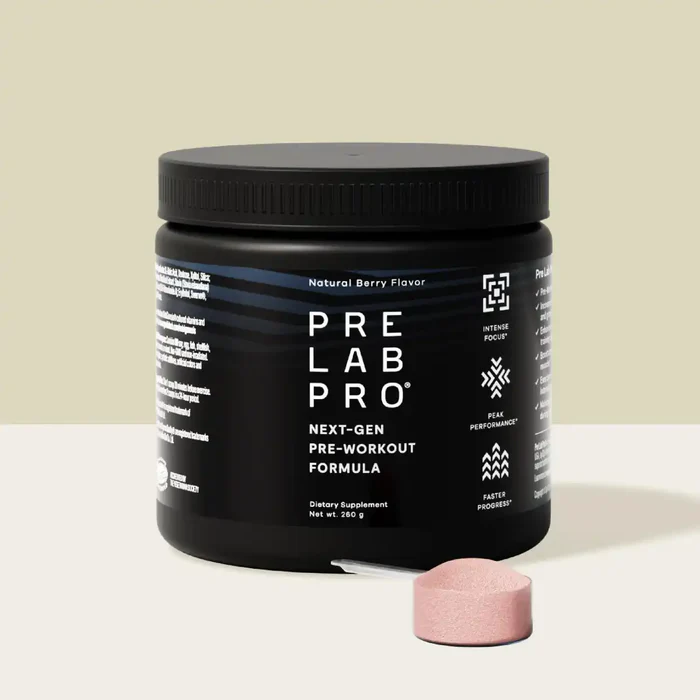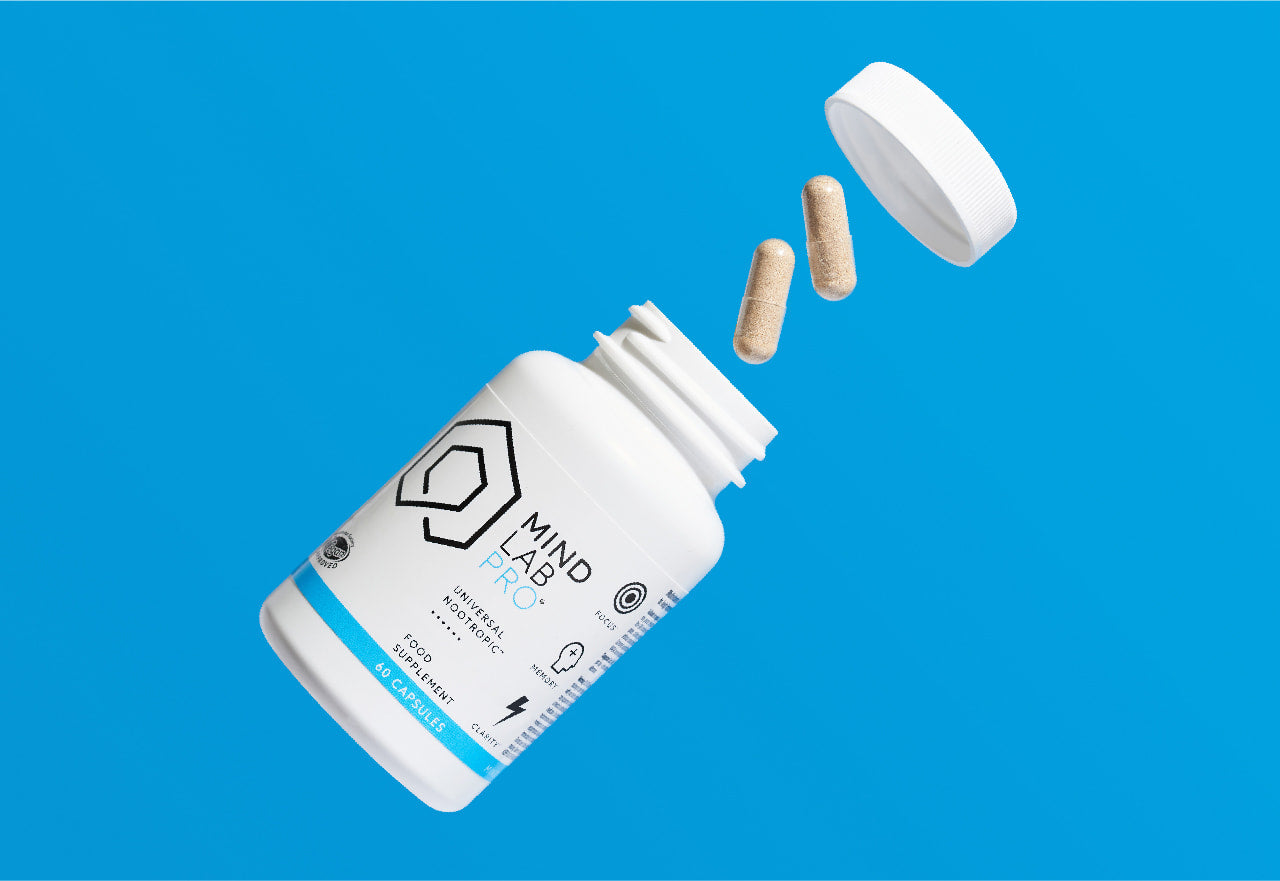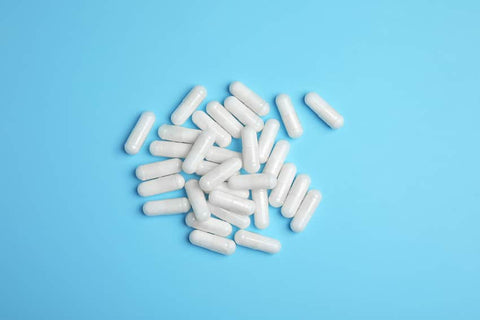Anyone into health and fitness is always looking for ways to improve their performance. When it comes to supplements to do that, there’s no shortage.
Pre-workouts, electrolytes, BCAAs, EAAs, protein, carbs, other supplements… the list goes on. But if you’re looking to maximize muscle growth, there’s one that consistently sparks interest - creatine.
Creatine has been the gold star for muscle growth for ages, and it’s one of the most popular ergogenic aids used among bodybuilders and athletes.
While it has a lot to offer for performance and recovery, what about for times when you’re not training? Can you take creatine without working out?
We’re looking at the science behind creatine - what it is, what it has to offer, and if there’s a benefit to supplementing without training.
Key Takeaways
- Creatine’s main benefits (muscle growth, recovery) are most pronounced when paired with training.
- There is evidence for benefits even without exercise: cognitive function, ageing, certain health & recovery contexts.
- Some effects without working out are limited or modest; expectations should be realistic.
- Safety profiles are strong, side-effects are rare when used properly.

What Is Creatine?

Creatine is a naturally occurring compound found in the body, made by the liver and kidneys from three amino acids - methionine, glycine, and arginine - and plays a significant role in energy availability. (10)
It’s important for regeneration of the body’s main source of energy, adenosine triphosphate (ATP), which is used to power every biological process that happens within your body. (9)
The body maintains pretty large creatine stores, with approximately 95% of creatine stored in muscles as phosphocreatine and the remaining 5% divided between the brain and testes. (1). Creatine stored in muscles is an important component for the regeneration of ATP.
The body relies on a constant supply of ATP to fuel all activities, including muscular contraction. When ATP is not regenerated at a fast enough pace, any activity comes to a screeching halt, which probably means an abrupt end to your training session.
The Creatine Phosphate System Explained
Let's talk about the science behind creatine for a second.
The main role of creatine during exercise is to combine with a phosphoryl group (Pi) to form phosphocreatine.
Because prolonged high-intensity activity rapidly depletes phosphocreatine stores, unless replenished, energy output will also decline. (2).
Supplementing with creatine therefore helps to increase the amount of phosphocreatine stored in the muscles, which can then be used to make more ATP energy. More energy production can only be helpful to build muscle.
This entire process guarantees ATP availability during high-intensity, maximal effort anaerobic activities. (1)
When ATP cannot be regenerated, maximal effort takes a massive hit and your power output tanks. This is why athletes and weight lifters recommend creatine supplementation.
Health Benefits Of Creatine
For most people, creatine supplementation potentially means more muscle mass, increased muscle strength and better muscle performance.
While creatine plays a major role in supporting maximal muscle growth and lean muscle mass, it also plays a role in recovery.
In addition to supporting muscle recovery, creatine potentially offers other benefits such as improved bone health, enhanced brain function, and reduced mental fatigue.
1. Better Performance to Build Muscle and Improve Body Mass

If you’re looking to enhance exercise performance, and boost muscle growth, creatine is your guy.
Because muscle cells require a constant supply of energy and rapidly utilize phosphocreatine during high-intensity exercise, supplementing with creatine boosts muscle stores, which translates directly to more energy, more power, and more muscle growth.
Creatine helps to build muscle by delaying fatigue in muscle fibers during high-intensity exercise, which allows for more training volume and greater hypertrophy. It's worth noting that some studies notice this result more in men than in women's health. (11, 1)
A larger creatine phosphate pool also leads to faster regeneration of ATP, which helps support rapid recovery after intense exercise.
Some studies suggest it can also reduce blood lactate accumulation during low-intensity aerobic activity, thus improving lactate threshold and ventilatory threshold. (12)
Key Insight
What’s more, research suggests that creatine supplementation may also be beneficial for aerobic exercise.
Once exercise surpasses 150 seconds, the benefits of creatine on ATP regeneration decrease, but studies show that creatine supplementation may actually alter substrate utilization for energy production, possibly leading to an increase in endurance performance. (3)
Creatine dosage can be tailored based on body mass, such as 0.1 g/kg of body mass, to optimize effectiveness and safety. (13)
If that’s not enough, studies have found that creatine supplementation can boost levels of insulin-like growth factor 1 (IGF-1), which has powerful anabolic effects on muscle and may further enhance muscle growth by mediating the growth-promoting effects of growth hormone (GH). (4).
2. Stronger Recovery
 Recovery is a part of performance that many athletes neglect. While things like diet, sleep, stress levels, and the like play a significant role in supporting muscle recovery, supplementation does, too.
Recovery is a part of performance that many athletes neglect. While things like diet, sleep, stress levels, and the like play a significant role in supporting muscle recovery, supplementation does, too.
Studies find that when combined with carbohydrates (glucose) post-workout, creatine supplementation may improve both creatine and carbohydrate retention in muscle. (1)
Because replenishing muscle glycogen stores is essential for muscle recovery, it can help to speed up the rate of repair and recovery, which is crucial for ongoing muscle building. (1). Potentially helping to ease muscle fatigue and support energy levels.
Additionally, there is also potential for creatine to reduce the extent of muscle damage incurred with intense training. Studies show that supplementation can reduce several markers of inflammation, including cytokines, prostaglandins, tumor necrosis factor (TNF) alpha, and lactate dehydrogenase (LDH). (5, 6).
Creatine supplementation may also help reduce muscle cramping and muscle cramps during the recovery process. (1)
Creatine Monohydrate: The Best Form of Creatine Supplementation
Creatine is available in various forms, including creatine powder, liquid creatine, and creatine ethyl ester, but most research supports creatine monohydrate as the most effective form compared to other supplements. (9)
A creatine supplementation strategy can be tailored to individual goals, whether for rapid performance enhancement, long-term muscle saturation, or additional health benefits.
Learn how often to take creatine here.
Creatine + Pre Lab Pro Pre-Workout for More Power
 If you intend to take creatine for exercise performance, you might want to combine it with an effective pre-workout, such as Pre Lab Pro.
If you intend to take creatine for exercise performance, you might want to combine it with an effective pre-workout, such as Pre Lab Pro.
Pre Lab Pro includes not one, but two Nitric Oxide boosters for improved blood flow to the muscles, plus a modest 80 mg of caffeine, as well as some performance boosting nutrients.
Even better, it also contains some powerful nootropics - making it the first nootropic-enhanced pre-workout drink for extra focus and motivation.
Creatine + Caffeine: A Note
Some studies suggest caffeine use can reduce the effectiveness of creatine, which is why low to moderate caffeine intake (up to 200mg per pre-workout) is best. Avoid mega doses.
You may also want to stagger your pre-workout and creatine loading (3–5g per day, for example), waiting at least 1–2 hours after consuming caffeine before taking creatine.
Otherwise, taking both together can give you a powerful boost of energy ahead of training.
Can I Take Creatine Supplements Without Working Out?

One of the main reasons people choose to take creatine is to enhance workout performance and physical performance.
However, some people supplement creatine for benefits beyond exercise, such as supporting cognitive function and overall physical fitness.
There’s evidence that creatine may be beneficial for… (1)
-
Post-workout recovery, helping to recover from muscle strains and muscle tightness.
-
Injury prevention
-
Thermoregulation
-
Rehabilitation
-
Concussion and/or spinal cord neuroprotection.
-
Traumatic brain injury, with studies showing potential neuroprotective effects and support for recovery. (14)
-
Lowering cholesterol and triglyceride levels.
-
Reducing homocysteine levels
-
Acting as an antioxidant.
-
Minimize bone loss.
-
Support cognitive function. (1)
Note: Effects of creatine without regular training are typically more subtle. It’s better thought of as supportive rather than transformative in sedentary contexts. Medicinal use should be discussed with a health professional.
Creatine, Brain Health and Cognitive Function
Studies have found that creatine supplementation may benefit neurological and cognitive function. (7).
Research shows that higher brain concentrations of creatine are linked to improved neuropsychological performance. It may also improve cognitive function hindered due to sleep deprivation and/or natural impairment due to ageing. (15)
Additionally, one review found that creatine benefits older adults with improvements in fatigue resistance, strength, muscle mass, bone mineral density, and performance, some of which occur even without concurrent exercise. (8).
Best Dietary Supplement for Brain Health

If you're keen to enhance your mind as well as your body, you may want to add a quality nootropic stack like Mind Lab Pro to your daily routine. It doesn't contain creatine, so you can take it alongside creatine or on its own.
Mind Lab Pro is scientifically proven to support memory, and its 11 plant-based ingredients also help with focus, clarity, motivation, and more.

Safety and Side Effects of Creatine
Creatine supplementation is one of the most researched topics in sports nutrition, and for good reason - it’s effective, widely used, and generally considered safe for most people. (1)
Still, if you’re thinking about taking creatine supplements, especially without regular exercise, it’s natural to wonder about potential side effects and long-term safety.
When first taking creatine, initial weight gain is common, primarily due to the fact that creatine pulls water into muscle cells, leading to temporary water retention rather than an increase in body fat percentage.
Research indicates that creatine does not increase fat mass or body fat percentage, and may even contribute to reductions in body fat percentage with resistance training.
Creatine supplementation is generally safe for kidney function and liver health in healthy individuals, but those with kidney disease or liver disease should consult a healthcare provider before use. (16)
Final Thoughts
With all that said, creatine is one of those supplements that offers the biggest bang for your buck if you're training hard.
Its ability to rapidly regenerate ATP means that you'll not only get a pump like no other, but you can sustain that pump for increased muscle hypertrophy and a stronger recovery afterward.
It helps with increased muscle mass and may enhance physical performance and athletic performance.
However, based on available research, creatine may offer other non-training benefits, though its effect on muscle growth and recovery remains its primary role.
References
-
RB Kreider, DS Kalman, J Antonio, et al. International Society of Sports Nutrition position stand: safety and efficacy of creatine supplementation in exercise, sport, and medicine. J Int Soc Sports Nutr. 2017 Jun; 14(18).
-
TW Buford, RB Kreider, JR Stout, et al. International Society of Sports Nutrition position stand: creatine supplementation and exercise.J Int Soc Sports Nutr. 2007; 4: 6.
-
JD Branch. Effect of creatine supplementation on body composition and performance: a meta-analysis. Int J Sport Nutr Exerc Metab. 2003 Jun; 13(2): 198-226.
-
GR Adams. Insulin-like growth factor in muscle growth and its potential abuse by athletes. West J Med. 2001; 175(1): 7-9.
-
MB Cooke, E Rybalka, AD Williams, PJ Cribb, A Hayes. Creatine supplementation enhances muscle force recovery after eccentrically-induced muscle damage in healthy individuals. J Int Soc Sports Nutr. 2009 Jun 2; 6: 13.
-
RV Santos, RA Bassit, EC Caperuto, LF Costa Rosa. The effect of creatine supplementation upon inflammatory and muscle soreness markers after a 30km race. Life Sci. 2004 Sep 3; 75(16): 1917-24.
-
R Cooper, F Naclerio, J Allgrove, A Jimenez. Creatine supplementation with specific view to exercise/sports performance: an update. J Int Soc Sports Nutr. 2012;9(1):33.
-
ES Rawson, AC Use of creatine in the elderly and evidence for effects on cognitive function in young and old.Amino Acids. 2011;40(5):1349-1362.
-
Wax, B., Kerksick, C. M., Jagim, A. R., Mayo, J. J., Lyons, B. C., & Kreider, R. B. (2021). Creatine for Exercise and Sports Performance, with Recovery Considerations for Healthy Populations. Nutrients, 13(6), 1915. https://doi.org/10.3390/nu13061915
-
Bonilla, D. A., Kreider, R. B., Stout, J. R., Forero, D. A., Kerksick, C. M., Roberts, M. D., & Rawson, E. S. (2021). Metabolic Basis of Creatine in Health and Disease: A Bioinformatics-Assisted Review. Nutrients, 13(4), 1238. https://doi.org/10.3390/nu13041238
-
Wang, Z., Qiu, B., Li, R., Han, Y., Petersen, C., Liu, S., Zhang, Y., Liu, C., Candow, D. G., & Del Coso, J. (2024). Effects of Creatine Supplementation and Resistance Training on Muscle Strength Gains in Adults <50 Years of Age: A Systematic Review and Meta-Analysis. Nutrients, 16(21), 3665. https://doi.org/10.3390/nu16213665
-
Lee, S., Hong, G., Park, W., Lee, J., Kim, N., Park, H., & Park, J. (2020). The effect of short-term creatine intake on blood lactic acid and muscle fatigue measured by accelerometer-based tremor response to acute resistance exercise. Physical activity and nutrition, 24(1), 29–36. https://doi.org/10.20463/pan.2020.0006
-
Cooper, R., Naclerio, F., Allgrove, J., & Jimenez, A. (2012). Creatine supplementation with specific view to exercise/sports performance: an update. Journal of the International Society of Sports Nutrition, 9(1), 33. https://doi.org/10.1186/1550-2783-9-33
-
Roschel, H., Gualano, B., Ostojic, S. M., & Rawson, E. S. (2021). Creatine Supplementation and Brain Health. Nutrients, 13(2), 586. https://doi.org/10.3390/nu13020586
-
Xu, C., Bi, S., Zhang, W., & Luo, L. (2024). The effects of creatine supplementation on cognitive function in adults: a systematic review and meta-analysis. Frontiers in nutrition, 11, 1424972.
-
Chilibeck, P. D., Kaviani, M., Candow, D. G., & Zello, G. A. (2017). Effect of creatine supplementation during resistance training on lean tissue mass and muscular strength in older adults: a meta-analysis. Open access journal of sports medicine, 8, 213–226. https://doi.org/10.2147/OAJSM.S123529
-
Greenwood, M., Kreider, R. B., Greenwood, L., & Byars, A. (2003). Cramping and Injury Incidence in Collegiate Football Players Are Reduced by Creatine Supplementation. Journal of athletic training, 38(3), 216–219.












